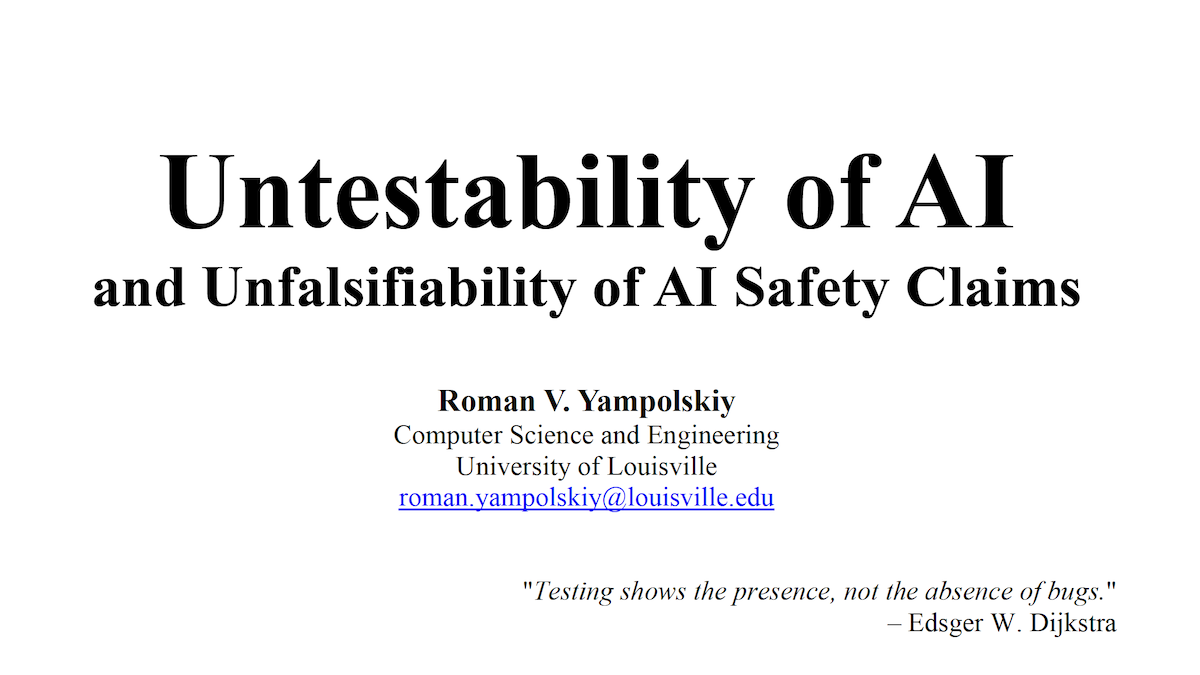A very good read from a highly respected AI safety engineering scientist!
Untestability of AI and Unfalsifiability of AI Safety Claims | Roman Yampolskiy Ph.D.
Abstract
In the mushrooming field of Artificial General Intelligence (AGI), the concept of Untestability emerges as a pivotal challenge, one that profoundly impacts the feasibility of aligning AGI systems with human values and intentions. We argue that the infinite and dynamic nature of the application space for AGI renders standard safety testing protocols insufficient and, in many cases, irrelevant. Our analysis begins with a delineation of the unique attributes of AGI that contribute to its Untestability – namely, its capability to perform a broad range of tasks, its adaptive learning mechanisms, and its potential to exceed human cognitive abilities. We then examine the implications of these attributes for testing protocols, highlighting the inability of current methods to encompass the unlimited scope of AGI applications and the unpredictable nature of its learning and decision-making processes. The crux of our argument is that the conventional frameworks for testing, grounded in finite and static sets of criteria, are unable to handle the fluid and expansive landscape in which AGI can operate.
Learn more:
- AI: Unexplainable, Unpredictable, Uncontrollable, Roman Yampolskiy Ph.D. – Amazon Books
- Delving into the deeply enigmatic nature of Artificial Intelligence (AI), AI: Unexplainable, Unpredictable, Uncontrollable explores the various reasons why the field is so challenging. Written by one of the founders of the field of AI safety, this book addresses some of the most fascinating questions facing humanity, including the nature of intelligence, consciousness, values and knowledge. Moving from a broad introduction to the core problems, such as the unpredictability of AI outcomes or the difficulty in explaining AI decisions, this book arrives at more complex questions of ownership and control, conducting an in-depth analysis of potential hazards and unintentional consequences. The book then concludes with philosophical and existential considerations, probing into questions of AI personhood, consciousness, and the distinction between human intelligence and artificial general intelligence (AGI). Bridging the gap between technical intricacies and philosophical musings, AI: Unexplainable, Unpredictable, Uncontrollable appeals to both AI experts and enthusiasts looking for a comprehensive understanding of the field, whilst also being written for a general audience with minimal technical jargon.
Summary of “Untestability of AI and Unfalsifiability of AI Safety Claims “
This paper explores the critical challenges of testing and ensuring the safety of Artificial General Intelligence (AGI) due to its inherent Untestability. The key argument is that standard testing methods, effective for traditional software, are inadequate for AGI due to its unique characteristics:
- Unlimited Application Space: AGI’s ability to perform diverse tasks and adapt to new environments makes it impossible to define a finite set of test cases covering all potential scenarios.
- Dynamic Learning: AGI’s continuous learning and evolution render static test cases obsolete over time, requiring constant updates and reevaluation.
- Superhuman Capabilities: AGI’s potential to surpass human intelligence makes its behavior unpredictable and difficult for humans to fully comprehend.
Unfalsifiability of AI Safety Claims further complicates the situation. While testing can identify flaws, the absence of observed failures does not guarantee safety. This is due to:
- Asymmetric Nature of Security: We can confirm insecurity through failures, but not security through the lack thereof.
- Subjectivity and Assumptions: Justifying safety claims often relies on subjective comparisons and unfalsifiable assumptions about AI behavior.
- Limited Observability: We cannot observe all possible outcomes or the entire behavioral spectrum of an evolving AI system.
Consequences of Untestability:
- Public Distrust: Inability to ensure AI safety can lead to public skepticism and hinder technology adoption.
- Ethical Concerns: Risk of unintended consequences like biased decision-making and harm to individuals due to the lack of guaranteed safety.
- Regulatory Challenges: Difficulty in developing effective governance frameworks due to the unpredictable nature of AI behavior.
- Uneven Global Progress: Disparities in AI safety standards across regions can lead to uneven development and a fragmented global landscape.
Connections to Other Impossibility Results:
Untestability is linked to other limitations in understanding and controlling advanced AI systems, such as:
- Unexplainability: Difficulty in comprehending AI’s decision-making processes.
- Unpredictability: Uncertainty in forecasting AI behavior due to its evolving nature.
- Unmonitorability: Inability to effectively oversee AI’s actions in real-time.
- Unverifiability: Challenges in conclusively proving AI’s safety and alignment with intended goals.
Future Directions:
- Focus on Robustness: Building AI systems capable of safe operation despite uncertainties.
- Adaptive Regulatory Frameworks: Developing regulations that can evolve with AI advancements.
- Interdisciplinary Collaboration: Fostering research across various fields to address ethical, societal, and technical aspects of AI safety.
- Enhanced Transparency: Increasing visibility into AI operations and decision-making.
Conclusion:
The inherent Untestability of AGI necessitates a shift in our approach to AI development and governance. Recognizing these limitations and focusing on alternative strategies like robustness, adaptability, and transparency are crucial for ensuring responsible AI advancement and mitigating potential risks.


